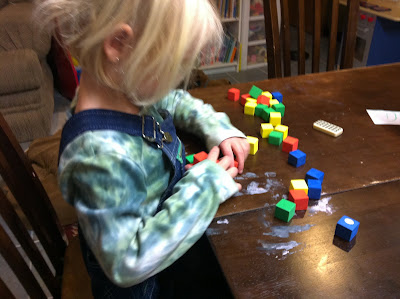 One of the areas that has really helped the kids learn math is playing online games like Stardoll and Club Penguin. They are given amounts of money, and then have to budget it over a month. They have to add and subtract amounts to determine if they'll have enough to buy what they want, and to hold them over until they get "paid" the following month.
One of the areas that has really helped the kids learn math is playing online games like Stardoll and Club Penguin. They are given amounts of money, and then have to budget it over a month. They have to add and subtract amounts to determine if they'll have enough to buy what they want, and to hold them over until they get "paid" the following month.  I've also tried to keep on hand several sets of math manipulatives -- we have colored bears with sorting cups, colored foam blocks, dominoes... really any group of things can be a math manipulative. The kids add, subtract, sort, multiply, make patterns, etc. with them. Zhara loves to make up games for the littler kids with them, and she and I have started playing a game with the dominoes. The domino set we got for $2 at the thrift store has high amounts of dots on many of the dominoes. She is learning to figure out the amount of dots by multiplying the width and length numbers. Then she goes to the multiplication table we have on the wall of the Learning Room to figure out the amount, and she is starting to remember many of the multiplication amounts without looking.
I've also tried to keep on hand several sets of math manipulatives -- we have colored bears with sorting cups, colored foam blocks, dominoes... really any group of things can be a math manipulative. The kids add, subtract, sort, multiply, make patterns, etc. with them. Zhara loves to make up games for the littler kids with them, and she and I have started playing a game with the dominoes. The domino set we got for $2 at the thrift store has high amounts of dots on many of the dominoes. She is learning to figure out the amount of dots by multiplying the width and length numbers. Then she goes to the multiplication table we have on the wall of the Learning Room to figure out the amount, and she is starting to remember many of the multiplication amounts without looking.We also, as a family, really like to play board games and puzzles. Puzzles are awesome for spatial relationships. Board games often involve adding, subtracting, multiplying, keeping track of scores, and even reading charts. Yesterday the kids and I played Yahtzee Jr. When it came time to figure out the scores, Angus read the chart that the Yahtzee Jr. board forms, and Zhara recorded them, added them up, and decided who was the winner.

So when you're kids are playing video games or online games or anything with numbers or amounts involved, pay attention, they very well may be picking up WAY more math than you expect.


This is inspiring and reassuring. Math was never one of my strong subjects. Let me rephrase that. I hated math. So I too worry how the hell I will be able to encourage it. But you are right. It will happen.
ReplyDelete